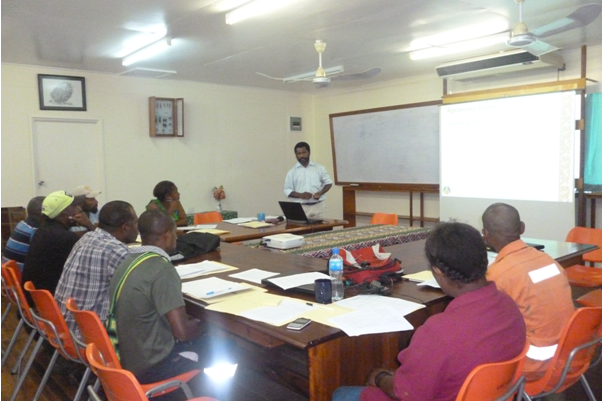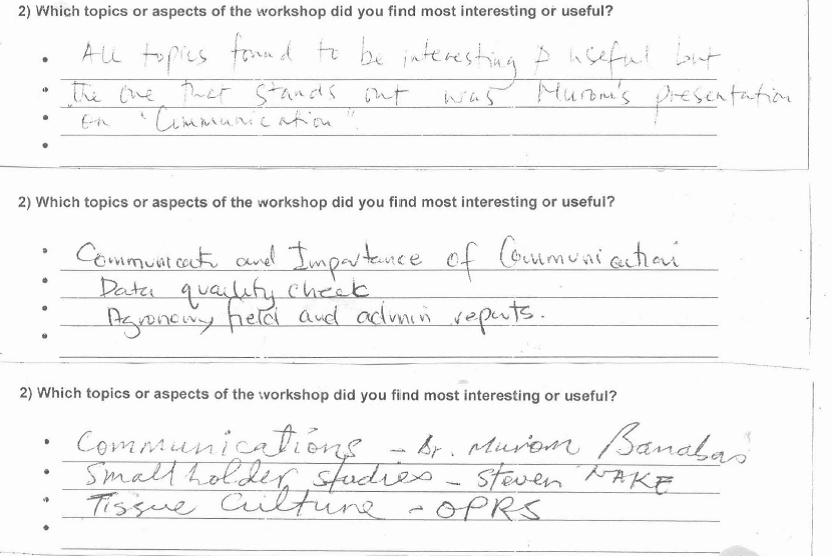

Communication knowledge spreads in PNG – full report
April 15, 2015
This is the report submitted by Dr Murom Banabas from the PNG Oil Palm Research Association Inc.
It reports the activities that have developed out of his attendance at the Crawford Fund Master Class on Communicating Research to Stakeholders, held 25th – 30th May 2014 in Fiji.
Introduction
The oil palm industry is a very important industry in Papua New Guinea because it is the highest private sector employer. It contributes significantly to the national economy and many smallholder farmers, their families and dependents rely directly on this industry for their livelihoods. A major agronomic constraint to increasing productivity in smallholder farms is insufficient plant nutrients in the soils to meet the crop’s requirements. In addition to the need for fertilisers, pests and diseases and socio-cultural issues are also of concern to the industry. PNG Oil Palm Research Association (OPRA) continues to address these issues by communicating technical information in a number of ways including: field days with farmers, training of extension officers, radio broadcasts, distribution of posters and one-to-one contact with farmers and industry staff.
During the Master Class in Fiji, it became evident that there was no systematic approach to designing and planning how to communicate technical messages to stakeholders within the industry. The Master Class provided the opportunity to learn the skills required to plan and implement various means of communications to get the best outcomes for stakeholders from technical information.
Many officers are involved in communicating with stakeholders about improving oil palm productivity and enhancing living standards of farmers. Proper communication planning will help get the message across effectively to farmers and have better outcomes.
This is a short report on activities carried out after the Master Class in Fiji.
Activities
The first activity after returning to PNG was to conduct a three day workshop (27th – 29th November 2014) for all the agronomists, agronomy supervisors, senior recorders, agronomy data entry clerks and staff in the smallholder studies research section. Staff from five sites across PNG attended the workshop. The workshop was intended to a) better understand and standardise field trial management procedures, b) appreciate the importance of data quality and c) develop communication plans to relay technical messages, particularly for fertiliser management, to the plantation staff, extension officers and smallholder farmers.

The workshop involved all the staff presenting a topic related to their work, followed by a discussion. A session was also held regarding developing a communication plan, emphasising the importance of audience, the content and style. All the staff are involved in communication with stakeholders in their jobs and found the training very useful. Some of the comments from the review after the workshop are as shown below.

After the presentation, it was agreed that more training on developing communication plans was required for the organisation.
A second training session, just for developing communication plans for staff in Pathology and Entomology Sections, was organised on the 30th of January 2015. The staff who attended ranged from scientists to field recorders.
After the two sessions, the participants were asked to make a 5 minute presentation which was captured on video. The presentations were then played on screen and comments were made on what areas could be improved. This part is ongoing.
Between the 20th and 25th of February 2015, a series of training sessions were provided to Technical services staff at Guadacanal Plains Palm Oil Limited (GPPOL), an oil palm plantation company in the Solomon Islands.
The trainings sessions were:
a) First session: Identifying frond positions in the canopy and using a ready reckoner to collect leaf samples for analysis and physiological measurements.
b) Second session: Using soil pits to identify major soil types. Pits were dug in major soil types and descriptions done accordingly.
c) Third session: Communication planning with smallholders and TSD staff. Plant nutrition topics were also discussed during this training.
Summary
There are plans for a series of training workshops on communication planning for industry smallholder extension officers and sections within the company that deal with smallholder farmer affairs later in the year. The training will also roll out to other sites in the country.
With the above report, I thank Crawford Fund for funding me to attend the Master Class – Communicating Research to Stakeholders. The training was very useful and relevant for the type of work I am involved. In particular I would like to thank Cathy Reade for ensuring that I attended the workshop. I also thank my employer, PNG Oil Palm Research Association Inc for allowing me time to attend the workshop. Finally, thanks to all the wonderful participants from the Pacific Region, I learnt a lot from your shared experiences
Dr. Murom Banabas
Head of Agronomy
PNG Oil Palm Research Association Inc.




